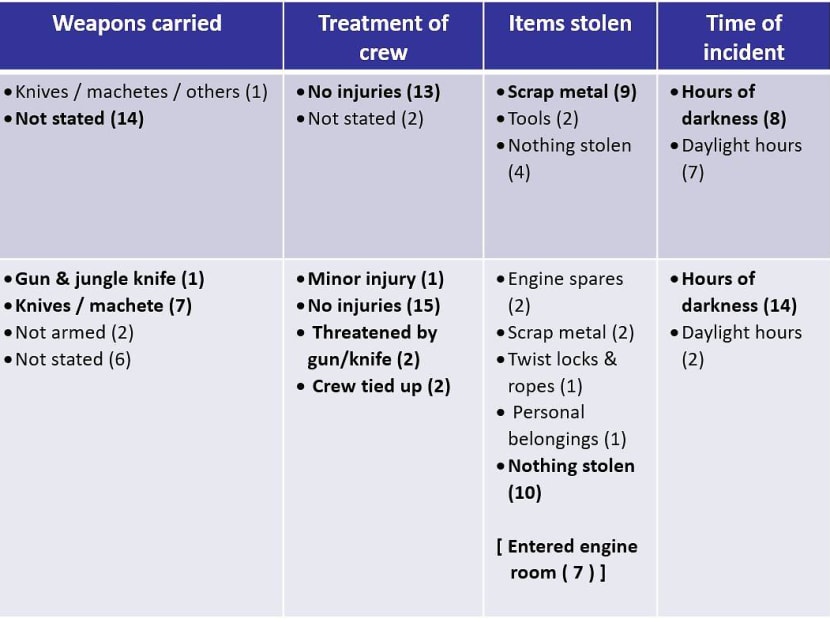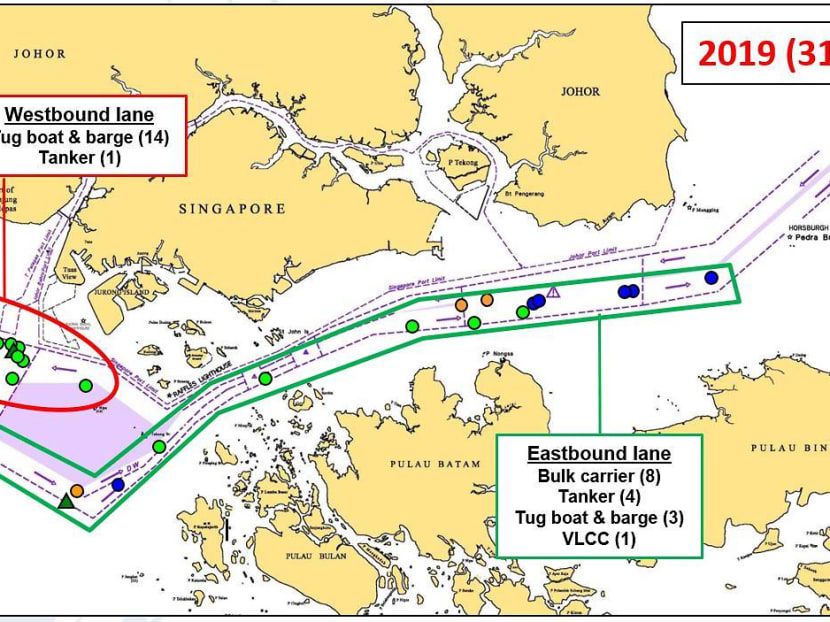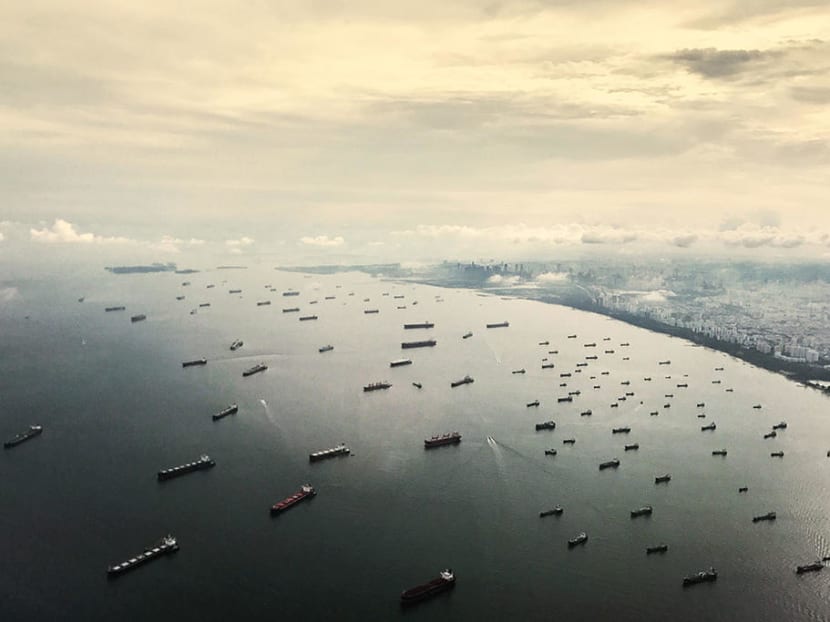Sea robbery incidents in Singapore Strait hit 4-year high
SINGAPORE – Ships in the Singapore Strait were boarded by suspected robbers in 31 incidents in 2019 - a four-year high, according to a maritime information sharing centre on Wednesday (Jan 15).
SINGAPORE – Ships in the Singapore Strait were boarded by suspected robbers in 31 incidents in 2019 - a four-year high, according to a maritime information sharing centre on Wednesday (Jan 15).
There were only 17 incidents from 2016 to 2018, although this peaked at 99 in 2015.
Nine of the incidents last year involved armed perpetrators, with crew reporting injuries in one case, said the Regional Cooperation Agreement on Combating Piracy and Armed Robbery against Ships in Asia (ReCAAP) Information Sharing Centre.
In two of the cases, crew reported being tied up while two cases involved crew being threatened with a gun or knife.
Items ranging from a gold chain to engine spares and scrap metal were stolen in 19 of the incidents. Analysts have said there is a black market for scrap metal, with the price of materials like iron and copper increasing over the years.

A breakdown of the 2019 incidents in the Singapore Strait. (Source: ReCAAP Information Sharing Centre)
ReCAAP centre's executive director Masafumi Kuroki told reporters he hopes Singapore, Malaysia and Indonesia improve their sharing of information and enforcement in the strait.
"The message is to ask the littoral states to enhance their surveillance and patrol in the Singapore Strait because of this rapid increase of incidents," he said.
"The Singapore and Malacca straits are very important for international navigation, therefore the responsibility is on all the littoral states to keep the straits safe and secure."
In one of the more serious incidents of 2019, six perpetrators armed with knives boarded the tanker Jag Lalit on Dec 20 about 6.5km north of Indonesia's Pulau Nongsa.
The perpetrators punched a crew member in the face and stole a gold chain from the chief engineer, leaving the latter with bruises on the neck.
The ReCAAP centre said the Taiwan-bound tanker diverted to Singapore for the crew's safety, adding that the Singapore Police Coast Guard boarded the ship for investigation and confirmed that crew members were safe.
WHERE THE INCIDENTS HAPPENED
The 2019 incidents took place along the entire length of the Singapore Strait in the eastbound and westbound lanes of the traffic separation scheme, which ensures vessels going in the same direction stay in a specific lane.

Location of 2019 incidents in the Singapore Strait. (Source: ReCAAP Information Sharing Centre)
Mr Kuroki said it was difficult to say whose territorial waters each incident occurred in, pointing out that both the ships and perpetrators were constantly crossing borders. "It's a transnational crime," he said.
But a maritime expert said the 2019 incidents took place in Indonesian waters. Principal defence analyst at Jane's Ridzwan Rahmat said this is based on the 1973 and 2014 border agreements between Singapore and Indonesia.
REASON FOR THE RISE
Assistant director of research at the ReCAAP centre Lee Yin Mui said the increase in incidents could be due to complacency by crew members and a decrease in enforcement by the authorities.
"Enforcement needs to be stepped up," she said, pointing out that the number of incidents dropped significantly in 2016 following reports that Indonesian authorities had arrested some of the perpetrators in the past two years. "It's a form of deterrence."
Mr Ridzwan attributed the spike to a lack of enforcement by the Indonesian navy as it redeployed its fleet of patrol boats across different naval bases from end-2018 through most of 2019.
"There is a very close relation between what I think is the absence of patrol vessels that was happening because of the reshuffling and the spike in incidents right now," he said.
Another factor, he said, is that Indonesia is committing its ships to the territorial stand-off with China in the Natuna Sea, leaving a gap in the Singapore Strait.
"The fleet that oversees the Strait of Singapore also oversees the Natuna Sea," he said. "If you were the Indonesian naval commander, where would you be prioritising your fleet?"
Mr Ridzwan said he expects to see an "elevated number" of incidents in 2020 as the stand-off is still ongoing. "I suspect there will still be a lack of resources committed to the Singapore Strait," he said.
Mr Kuroki said shipping companies are increasingly concerned about the large number of incidents, but noted that the Singapore Strait is safer than areas like the Sulu-Celebes Sea near Sabah and the Philippines, where reports of crew members getting abducted are not uncommon.
From 2016 to 2019, the area saw 19 actual and 11 attempted abduction cases.
"I think the littoral states are enhancing regional cooperation," he said, pointing out that the number of incidents in 2019 is still an improvement from 2015.
WHAT IS BEING DONE?
Singapore's Defence Ministry (MINDEF) on Wednesday said representatives from Singapore, Malaysia, Indonesia and Thailand are meeting in Singapore until Thursday to discuss the "increased incidence" of sea robberies in the Singapore Strait.
Under the Malacca Straits Patrol, these countries have since 2004 shared intelligence, conducted sea patrols and combined maritime air patrols to keep the Malacca and Singapore straits safe.
"Member states will discuss ... possible measures to strengthen information-sharing and operational coordination to deter and disrupt such sea robberies within their respective territorial waters in the Straits of Malacca and Singapore," MINDEF said.
Singapore's Transport Minister Khaw Boon Wan also met ReCAAP officials on Wednesday to express his concerns regarding the recent incidents and discuss possible cooperation initiatives with regional players.
Mr Khaw said the Straits of Malacca and Singapore is a busy waterway and an important lifeline to many countries, adding that the region is developing a cruise industry with "huge potential".
"Recent sea robbery incidents in our vicinity are troublesome," he wrote in a Facebook post on Wednesday. "Ensuring maritime safety is therefore a priority for all. The key is regional cooperation."
WHAT MORE CAN BE DONE?
Mr Ridzwan said Singapore, Malaysia and Indonesia can work on implementing a "hot pursuit arrangement" that allows patrol ships to cross maritime boundaries when chasing perpetrators.
"When the Singapore coast guard sees the perpetrator, for example, there is only a certain distance it can chase," he said. "The moment the perpetrator crosses the territorial line, it stops chasing, no matter what happens."
Mr Ridzwan said the countries have signed high-level agreements on the issue, but they have not been translated into standard operating procedures on the ground.
"We are going against an enemy that does not respect maritime boundaries," he added. "But our law enforcement agencies have to respect maritime boundaries." CNA
For more stories like this, visit cna.asia.










